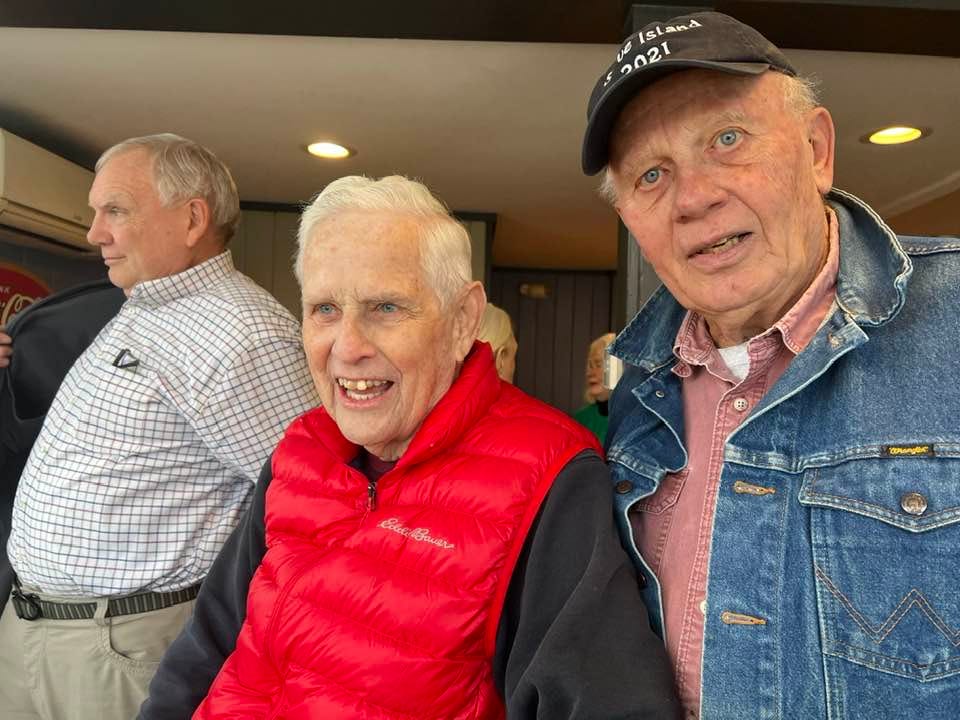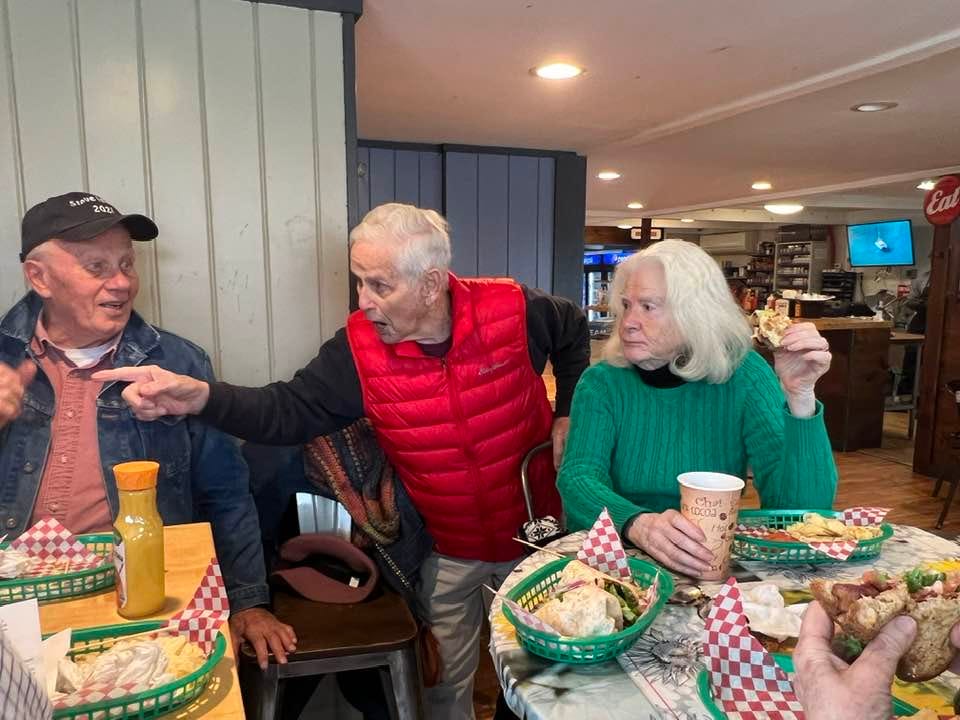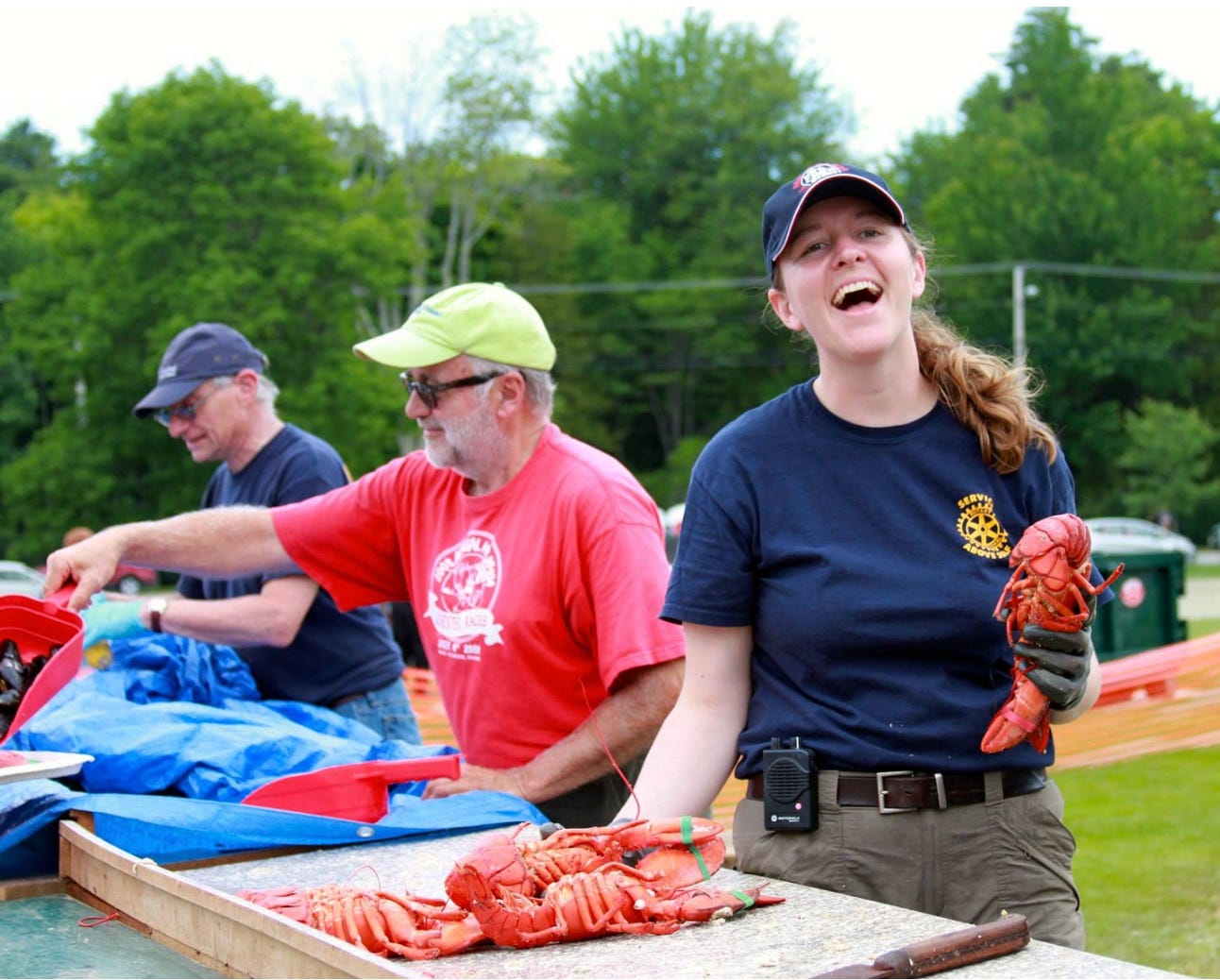BAR HARBOR—Bar Harbor has lost one of its best lobsters, showmen, and philanthropists. On August 22, Cary Swan, long the lobster at the end of the Fourth of July parade, died. He was 85.
For years, Cary rode the last float of the parade, dressed as a lobster, laughing, waving and showing off his barker skills as he urged everyone to come back to the town ball field off Park Street and enjoy some lobster with the Rotary Club.
Some people create legacies that will change a town for decades. Cary Swan was one of those people.
The life of the party. Driven. Fun. Kind. Music lover. Baseball player and coach. Umpire. Hockey enthusiast. Singer. Performer. Scooter driver. A man who always had something going on. A storyteller. For those who heard him, his version of “My Way” became more iconic than Sinatra’s.
That’s because Cary was an icon.
Cary was one of those Maine men who made a difference every time they interacted with others, creating legacies and stories that follow in their wakes no matter how choppy the waters.
A former president of the Kebo Valley Golf Club, helping to ensure it had a new club house, a board member of the Independent Insurant Agent’s Industry Association, Swan’s influence went beyond Bar Harbor and even beyond Maine.
Cary was one of the founders of the Bar Harbor (MDI) Rotary Club in 1968. He recruited 27 other men to join. They met at the Mary Jane Restaurant, the Mast and Rudder, and also the Bar Harbor Congregational Church’s vestry. That club began (and still runs) the Fourth of July pancake breakfast and seafood festival; the profits of that massive undertaking go to local scholarships and to help fund local civic organizations. It often raises more than $40,000 each year.

A 2018 article in the Mount Desert Islander by Sam Shepard reads,
“The club had a trial run of the festival with a custom-built cooker to steam clams, lobsters and potatoes. The initial tests, held at Somes Sound, went perfectly. Swan said.
“We were all set for [the festival,]” he said. “‘Nobody can stop us now,’ we thought.”
“Club members spent the night before the festival piling clay under the cookers to keep them level on the incline of the seaplane ramp, but it rained before the festival. While they worked to keep the steamers level, it was the steamers themselves that proved problematic.
“These two ladies holler at me ‘Sir, these clams, we open them up and they shut right back up,’” Swan, who served as the fifth president of the club, laughed. They were still alive! I said, ‘Ladies, that shows that they’re really fresh.’”
“The club switched to cooking the lobsters in barrels the next year and has done so ever since, Swan said.”
That club, because of Cary and those charter members and those who came after him, revitalized a playground, started reading programs, put thousands and thousands of dollars into the Bar Harbor and MDI community and beyond. That club, a club that existed because of Cary, brought water to people in other countries, fitted people to wheelchairs, helped local kids pay for college, put food in backpacks, picked up roadside trash, honored local people via the Paul Harris Fellowship for the good that they did, and has fed tens of thousands. But it also created friendships along the way, friendships that often strengthened individuals so that they could go out and make the world a better place, too.

Cary made a difference. He continues to do so.
With his wife June (Hudon), he founded the Swan Agency back in 1975. Their 62nd wedding anniversary is September 16. Cary and June moved to the island in 1968.
They arrived from western Maine and got to work. The family dining room became an office. Eventually, the duo’s success let them to expand at 43 Cottage Street.
But it isn’t just his founding of the club or his business that made Cary special, that made his impact felt. It was who he was as a human.
“Cary was a great role model and always lit up the room with his smile and stories. He left a lasting mark through his key role in organizing and starting the Bar Harbor (MDI) Rotary club. He will be missed,” said Ron Wrobel, former president and current treasurer of the club.
STORY TELLER
Cary also leaves behind his songs. Back in late 2011, country music singer Aaron Benward put one of Cary’s stories into song, “Hope You Won’t Forget.” It was a love poem. He’d written it not in 2011, but 53 years earlier.
Cause when I think about you sweetheart, it’s a bitter pill
When I try to outrun memories, there’s no chance I ever will. . .
- lyrics from “Hope You Won’t Forget”
This February, the Jesup Memorial Library announced that the Swans’ daughters, Kim Swan and Deanna Sherman, had donated to the capital campaign in their parents’ honor because their parents instilled such a great love of reading in them. The library’s story time space that is in the children’s wing is going to be named for Cary and June.
When I try to love you, I hope you won’t forget . . .
“Hope You Won’t Forget”
Cary leaves his legacy behind and is survived by June, his children Kimberly Swan, Deanna Sherman and her husband David, Christopher Swan and his wife Denise, and his three grandchildren Evelyn, Cameron, and Lily, as well as his nieces and nephews. He was predeceased by his parents Isa and Stanley Swan, and his brothers Stanley Jr., Richard, and George.
The days, the months, the years, have kept us far apart,
And now I’ve got to go and mend my broken heart.
“Hope You Won’t Forget”
“For me and Cary, it all started at 43 Cottage Street–the Swan Building,” said Lisa Horsch Clark. “There was a door at the top of the stairs. No one ever went in and no one ever came out, but I had heard it was the office of our building owner, our landlord, Cary Swan. When he was there, or what he did was a mystery to me, but then I realized if I listened carefully for his motor scooter, I might meet him.”
That scooter and his Kubota tractor became Cary’s trademark rides in the last few decades. Many tourists, coming out of the Shore Path and onto Waldron Lane met him on his tractor. He’d pet the dogs, talk to the people, sharing and collecting stories, just like he did with Horsch Clark, taking people under his wing for moments or lifetimes.
“Sure enough we met within the year of my joining the Friends of Acadia staff in 2005,” Horsch Clark said. “I had recently also joined the Bar Harbor Rotary Club, and he explained he was a member of the club. He didn’t tell me then it was his idea when he came to Bar Harbor in the late sixties that he brought the notion of starting a Rotary club with him. Those story telling sessions took place in the office downstairs many years later.
“I would often get a phone call from Cary saying, ‘Can I come up or can you come down? I have something I need to talk to you about.’
“I knew it wouldn’t be a short conversation, so I would clear my calendar for an hour. The stories from Cary were great over the years. I learned about our Bar Harbor Rotary Club founding story, our early members, our projects (the good ones and the not so good ones … that first Rotary seafood festival didn’t sound fun!), why we did what we did.
The thing Cary knew was that being a part of something bigger than yourself was important, even magical. Rotary gave its members that. So, did Cary. Rotary clubs transform lives for good. That’s a big mission that happens in small and large ways throughout our local community and in the world.
“We looked at old scrapbooks together. He would tease me. We would laugh. He would guide me on what do by sharing ideas. But I learned much more than Rotary information. I learned about the history of Bar Harbor, the island, and the companies in our town. He influenced many of them as a strong business leader.”
His influence as a business leader was also replicated on fields and rinks and stages. Cary was a performer since fourth grade. He produced shows at the Jesup Memorial Library. Old photos show him handily singing or announcing into a microphone.
Horsch Clark recalls, “Barbara Fox recently told me at lunch the story of Cary urging her to open her travel agency in his Swan building. He offered her a small office and encouragement and her successful Bar Harbor business was launched.
“Cary didn’t come to our weekly Rotary lunch meetings regularly but whenever he was needed, he always said yes. He was our cheerleader and always asked me what we were accomplishing at club and in my Friends of Acadia work when we passed in the halls.
“He financially supported our projects, both at Rotary and FOA. And he showed up when we really needed him, especially on the 4th of July and at other Rotary gatherings.
“During COVID, I really needed Cary. In 2019 or 2020, I had agreed to be the Rotary president and then COVID hit. Our club suffered as did many organizations. Our president, Stefanie Muscat, navigated online meetings and worked hard to provide safe but meaningful activities for club members.
“By the time my presidency started in 2021, I knew we needed to start meeting together again if our club was going to survive the pandemic. The trouble was, we were homeless; we had no place for our weekly lunch meetings. I boldly asked Cary if we could use an unused office suite in the Swan Building. He didn’t think it would work, but he talked with his family and agreed. I promised I would take good care of the space and make it a successful, temporary home for our club. I cleaned, organized, catered the lunch, and invited the Rotarians, including Cary, and it worked!
“We met in the Swan Building for a few months until we could find our current permanent meeting space. It was just the bridge we needed to get through the pandemic. The Bar Harbor Rotary Club continues to ‘provide service to others, promote integrity, and advance world understanding, goodwill, and peace through the fellowship of business, professional, and community leaders.’
“Cary was always generous with his time, his resources, his stories and his knowledge, I am so thankful that I had Cary as a friend and mentor. Truly a man who lived the Rotary motto: Service Above Self. We will miss you, friend.”
She will not be the only one missing Cary whose country music song’s lyrics seem an apt way to remember a man who not only made his own stories and legacies, but influenced so many others. That’s because Cary knew that teamwork on the stage or on the field or in an office or just on a street is the heart of community. Community, he knew, isn’t just about tearing things down when they don’t work, but building them up, too, creating structures and clubs and interactions that make everyone stronger, that create lasting change.
I hope you dream like I do almost every night
To finally see you one more time would be a beautiful sight.
- “Hope You Won’t Forget”

Updated: I forgot to share that I was once a president and member of our local Rotary club and the public image coordinator for much of the northern US and Eastern Canada. I apologize for not disclosing that.












